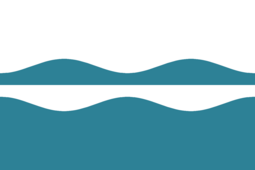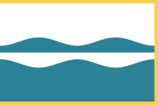Flag and emblem of Mava: Difference between revisions
No edit summary |
|||
| Line 20: | Line 20: | ||
==Design and symbolism== | ==Design and symbolism== | ||
The general design of the national flag of Mava was first established in the National Flag (Design and Specification) Order 1928, which was an Order in Council promulgated as a provisional flag law. The full design was eventually specified in the Flag Act 1929. According to the act, the flag is a rectangular cloth, with the ratio of its length to breadth being 3:2. The base is a horizontal bicolour of white and blue. At the bottom of the white bar is a wave "alike in appearance to a distant coastline", the high points and low points extending 31 percent and 16 percent of the height of the white bar respectively. The act specifies two high points. The lower half is the same as the upper, albeit mirrored with inverted colours | |||
There is no official interpretation for the colours of the flag. However, [[Prime Minister of Mava|prime minister]] Paaliuk Kaasatok suggested the following meanings: blue represents the ocean; white represents peace; the combination of the two represents the peace enjoyed by virtue of Mava's status as an island nation, separate from the Trianian continent; whilst the wavy charge represents the land. | |||
The designer of the flag, which was proposed anonymously, has been subject to some discussion. The most common view is that artist and heraldist Taamaket Yiiat is the designer, although he publicly claimed no involvement in its design. The official attribution is to "''Mavamuqtun Yakiialakat''" ("Mavean Patriot"; <small>lit.</small> "Mavean Country Lover"). | |||
===Colour scheme=== | ===Colour scheme=== | ||
{| class="wikitable" style="text-align:center;" | {| class="wikitable" style="text-align:center;" | ||
Revision as of 15:46, 26 June 2023
 | |
| Name | Kaamatuulikalat ("Our Blue Flag") |
|---|---|
| Use | National flag and ensign |
| Proportion | 2:3 |
| Adopted | 13 June 1925 |
| Design | A horizontal bicolour of white and blue, with a counterchanged wave mirrored horiontally. |
 Variant flag of Mava | |
| Use | Presidential standard |
| Proportion | 2:3 |
| Design | The national flag of Mava with gold border around the upper, lower, and fly side of the flag |
The flag of Mava consists of a horizontal bicolour of white and blue, featuring in its centre a stylised wave mirrored horizontally. The wave is counterchanged: that part within the white is coloured blue, and that within the blue part is coloured white. The flag was adopted on 13 June 1925 by resolution of the Mavean Assembly, being the first state symbol formally adopted following independence earlier that year. 13 June is celebrated each year as "Flag Day", which has largely superseded the country's official independence day as the primary day for national celebration.
The flags official name, as specified in the Flag Act 1929, is the "National Flag of the Republic of Mava" (Mavean: Kaamatyakii Maava Yakiinaigaalu). However, the flag is more commonly known as Kaamatuulikalat ("Our Blue Flag"), which is the name used by the Department for Education, Communities and Culture in its flag regulations.
Design and symbolism
The general design of the national flag of Mava was first established in the National Flag (Design and Specification) Order 1928, which was an Order in Council promulgated as a provisional flag law. The full design was eventually specified in the Flag Act 1929. According to the act, the flag is a rectangular cloth, with the ratio of its length to breadth being 3:2. The base is a horizontal bicolour of white and blue. At the bottom of the white bar is a wave "alike in appearance to a distant coastline", the high points and low points extending 31 percent and 16 percent of the height of the white bar respectively. The act specifies two high points. The lower half is the same as the upper, albeit mirrored with inverted colours
There is no official interpretation for the colours of the flag. However, prime minister Paaliuk Kaasatok suggested the following meanings: blue represents the ocean; white represents peace; the combination of the two represents the peace enjoyed by virtue of Mava's status as an island nation, separate from the Trianian continent; whilst the wavy charge represents the land.
The designer of the flag, which was proposed anonymously, has been subject to some discussion. The most common view is that artist and heraldist Taamaket Yiiat is the designer, although he publicly claimed no involvement in its design. The official attribution is to "Mavamuqtun Yakiialakat" ("Mavean Patriot"; lit. "Mavean Country Lover").
Colour scheme
Colors scheme |
Blue | White |
|---|---|---|
| RGB | 66-127-148 | 255-255-255 |
| Hexadecimal | #417F94 | #FFFFFF |
| CMYK | 32, 8, 0, 42 | 0, 0, 0, 0 |
Other flags
Presidential standard
Military flags
See also
- Politics of Mava
- Culture of Mava
Notes
External links
- Flag of Mava. International Flag Database



